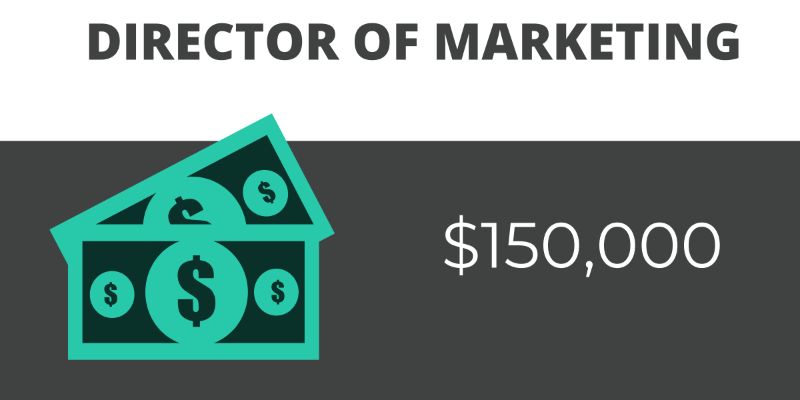
In America’s 2020 hundreds of millions of consumers buy products online, often making large purchases at the click of a button on Amazon. Online retail or e-commerce is such a booming market in fact, that in 2019 US online retail sales hit 343 billion–a number which is projected to grow to 476.5 billion by 2024.
These titanic numbers have international corporations and small businesses alike scrambling to catch the wave of e-commerce. Why this matters to you is that this trend has driven explosive growth in job markets tasked with aiding businesses in catching riding the e-commerce boom–jobs like digital marketing, content marketing, or SEO specialist.
All of these jobs can be gathered under the umbrella of ‘marketing’ which suggests the value and flexibility of this career path. That is, given the tremendous growth in key vectors, marketers can both make great money and tailor their profession to meet their individual interests–a strength absent from many career options.
If you are interested in business generally and unsure of whether you want to focus specifically on marketing, be sure to explore our guide to the best business schools. There you can explore what different programs offer to decide whether they match your goals and interests.

What are the Most Lucrative Marketing Jobs?
The best marketing jobs available are typically managerial positions that reward professionals for work history and demonstrable success. This means that unlike many other professions, students may not need to pursue a graduate level degree to reach these positions. But of course an advanced degree in marketing may decrease the overall time and effort required to reach the level of a marketing manager.
Marketing managers are at the forefront of guiding the largest of the world’s companies into future success. For an incredible breakdown of how differing marketing strategies can manifest, check out this infographic on the war between Apple and Google. These two companies are perfect examples for how many of the products we know and love today were designed according to near-incomprehensible market research.
If you do wish to pursue advanced education in order to reach upper echelon positions, you might want to consider a specialized graduate degree that can help you build expertise in a niche skill set. Otherwise an MBA in marketing can be an excellent jumpstart to learning the managerial responsibilities of business and marketing. See this resource to better understand all the things you can do with an MBA.
See these resources on advanced education in marketing:
Channel Development Executive
Earnings: $140,000 – $300,000
A channel development executive is a top-tier marketing professional tasked with overseeing all aspects of an organization’s sales channel development, organization policies, and partner channel collaboration. These professionals have usually developed a high level of expertise in a niche product or type of organization that allows them to take on a wide array of interdisciplinary responsibilities.
While this position is held by professionals who hold only a bachelor’s degree, this is one of the most competitive positions in the marketing job market and as such will only be available to professionals with exemplary work records.
Chief Marketing Officer
Earnings: $90,000 – $266,000
A chief marketing officer (CMO) is a head honcho at any organization. On the one hand they oversee the abstract visions of the marketing branch and on the other they oversee resulting business developments of marketing operations. In other words, the CMO is a position that marries the hard focus of bottom-line initiatives with the more artistic moves of marketing and advertising strategies.
Like a channel development executive this position is top tier and requires applicants to demonstrate either a tremendous work history or a highly distinguishing career in advanced academics. Marketing professionals might be best served to work their way up to this position while sticking in one industry (or type of marketing) in order to build expertise in the area of highest value to your chosen industry of focus.

Global Marketing Manager
Earnings: $80,000 – $160,000
The responsibilities of global marketing managers are implied in the name of this position, that is, these professionals oversee global marketing efforts. Global marketing managers are tasked with promoting products around the world with strategies that take into account the culture and economics of the area. For this reason the position incorporates various interdisciplinary skills and business knowledge, which can only be cultivated through working in the field or through advanced education.
This is why the earning potential is so high for these professionals, because so much investment of time and effort into the career is required before the doors to this job will be unlocked. If you are interested in pursuing this type of work specifically, there are many programs designed specifically for the global marketing profession.
Creative Director
Earnings: $48,000 – $160,000
A creative director determines the creative vision for a brand or organization and then carries out whatever tasks are required to bring that vision to a reality. As you might expect this means that the role of a creative director varies drastically from organization to organization–and as such, the preparation for landing this job will depend on the employer’s expectations.
Marketing professionals who want to work toward this position will want to cultivate an array of interdisciplinary skills of marketing, business, and design. While there is not necessarily a specific degree that accomplishes this, an MBA in marketing will provide a strong foundation in the areas of common responsibility to creative directors.
Content Marketing Manager
Earnings: $66,000 – $79,000
Content marketing is a profession whose responsibilities are implied by the title, that is, content marketers take on responsibilities for overseeing promotional content operations. They develop content pitches, assign content orders to in-house or outsource groups, and oversee general quality and performance metrics of content pipelines.
For aspiring content marketing managers to prepare their resumes, they will want to develop expertise in a specific type of content or be able to effectively manage various content pipelines–from visual content like videos or infographics to written content like articles and guides. Data visualization is a subcategory of this job type that focuses on how to present complex data in a visually appealing and understandable manner.

Product Marketing Manager
Earnings: $44,000 – $87,000
Product marketing managers are the professionals tasked with promotions, advertisements, and branding decisions for a specific product. These professionals may work in-house within an organization to oversee a specific product, or they may outsource their expertise to consult on products. Given the vastly different responsibility or expertise required to oversee different product operations, aspiring product marketing managers will want to build experience with industry-dominant products in order to build an appealing resume for future employers.
Many marketing degree programs–both undergraduate and graduate–offer specializations in product marketing, which will be an ideal route of preparation for marketing students.
Digital Marketing Manager
Earnings: $52,000 – $65,000
Digital marketing management is the field responsible for overseeing marketing operations that occur online or in the digital realm. In many cases these professionals manage client social media accounts and run social media promotions for client businesses or products. While this is a large job market with many different tiers of specialization, digital marketing as a whole has a low barrier of entry and many business owners become digital marketers simply by taking advantage of the marketing tools made available to businesses.
GIven the prevalence of digital marketing in an increasingly digital world, many marketing degree programs offer digital marketing education as standard components of course syllabi. Though if you wish to specialize in digital marketing you will want to make sure that your degree program offers more than just tertiary coverage.

Marketing Degrees and Specializations
Given the rapidly expanding marketing industry, the number of available marketing degree programs is growing. New specializations and areas of focus arrive each year, so let’s cover some of the most common degree options you will come across and what they offer to the student.
Marketing Communications
This specialization focuses on brand development, and how marketing professionals can employ a brand in order to create a psychological narrative in consumers. As such this specialization usually incorporates an increased focus on psychological marketing strategies and communication skills. (See Best Online Master’s for Communications)
Public Relations / Administration
Because public opinion is an implicit consideration in any marketing effort, many marketing degree programs will offer a specialization in public relations. This marketing specialization focuses on a curriculum designed to educate students on how to assess and adapt to public attention, both good and bad. (See What can I do with a Master’s of Public Administration)
Marketing Research and Analytics
Marketing research and analytics students conduct research and analyze data sets in order to develop appropriate strategies for products and branding operations. The extent and direction of such research depends almost entirely on the objectives of the client, though there is a tendency for market research to follow similar formats–such as determining popularity of competing products, SEO audits, and generating consumer profiles. Google for instance is able to gleen enormous amounts of information about planet Earth through our search behavior, which is demonstrated in this infographic. (See What can I do with a Business Analytics degree)
Marketing Management
As covered in the above section, some of the most lucrative marketing positions are those that are managerial in nature. It is important to mention as well though that there are both undergraduate and graduate programs that prepare the student for taking on marketing management positions. Some will be highly specialized while others will stick to a more general curriculum so as to give students a solid foundation for a variety of career paths in marketing management.
Social Media Marketing
Social media marketers are professionals who specialize in overseeing social media efforts. Social media marketing degree programs offer either a total focus on social media marketing or a tangential area of focus. As such these programs’ curriculum will cover the ins and outs in protocols for managing clients’ social media accounts as well as carrying out paid promotions within various social media apps such as Facebook or Instagram.
Global Communications / International Marketing
Marketing in the international context is one of the most lucrative fields for a marketing professional, and as such many marketing degree programs offer global communications degree specializations. These programs focus on educating students in industry trends within certain cultural or global contexts, as well as any other global variables that might impact business or marketing efforts.
More resources on international business and marketing:
- International MBA vs. Domestic MBA
- 10 Best Locations for International Business
- 10 Best International Business Schools
- What Makes an International Destination Business Friendly?

Questions to Ask before Enrolling in a Marketing Program
Because marketing is a profession that is uniquely positioned to value both work experience and education, the best route to take is usually the route that best leans into individual strengths. With this in mind, consider these questions to determine how to approach earning a marketing degree and what to do with it.
- Will you benefit most from a traditional program or an online program?
There are a multitude of marketing degree programs available online to choose from–many of which are offered though the best marketing programs in the country. This means that the only reason to choose a traditional degree program is if it fits your interests and meets your needs.
- Do you prefer to work in a solo work environment or in a group?
Marketing work is intrinsically social in nature, because it requires coordinating with other branches of your team or company in order to complete marketing plans, which are primarily composed of many tasks spread out over a marketing team. Even in the case of a solo marketer who works through remote-contract work, you will need to be able to effectively promote yourself and communicate with your clients.
- Do you prefer qualitative or quantitative work?
Marketing work typically skews toward qualitative work or quantitative work. Qualitative work refers to more ‘right brain’ tasks having to do with creativity, strategic judgement-making, or brand strategizing.
Quantitative work refers more to ‘left brain’ tasks having to do with data collection, computation, and logical analysis. While any marketing career is composed of a combination of qualitative and quantitative work, you can certainly engineer the balance in favor of your strengths if you prefer one over the other.
- Do you excel in interpersonal collaboration?
As mentioned above, marketing work is social in nature and if putting your social skills to the test is something you excel at then you might want to consider pursuing a marketing degree in marketing management, communications, global marketing, or public relations. Each of these career paths will reward the individual who is best at working with others in teams or partnerships.
- Are you certain of your career goals or are you more spontaneous?
Marketing careers can lead students along a variety of paths. Many of these career paths will require a large amount of preparation and foresight years in advance, while others might only be stumbled upon through sheer circumstance. Knowing which approach to planning best matches your personality will help you prepare for these career developments appropriately.
For instance, if you are someone who likes to make career decisions on the fly then you might be best served in pursuing a general degree that will let you take advantage of opportunities as they present themselves. If you want to plan out your career from start to finish you might be better off enrolling in a highly specialized degree that will build expertise toward landing your end-goal job.
- Do you prefer corporate comfort or contractual freedom?
Marketing professionals work in both corporate offices, small marketing agencies, and from home offices as independent contractors. With this in mind, marketing professionals have a tremendous amount of choice in choosing their ideal work environment. If you are unsure which you prefer, then seek out internships early in your career or during your education to decide which environment suits you best.

Marketing and Starting your Own Business
Because marketing is a crucial piece of the business puzzle, many entrepreneurs got their start as marketing professionals. Conversely, many entrepreneurs become marketing professionals after running a startup by virtue of the marketing tasks and responsibilities embedded in the process of starting your own business. (Here’s an introductory course on starting your own business). Similarly, if you have entrepreneurial goals you can explore the best schools that support startups.
If you currently have a startup or plan to start one, be sure to speak with marketing program heads to decide if they provide an appropriate education to support such an endeavor. Unfortunately, the type of marketing that will most benefit a startup business will depend mostly on the type of business, so you will likely need to know that going into your education.
Here are some other great resources for entrepreneurial minded students:
The 10 Best Online Marketing MBAs
The 10 Best Online Master’s of Marketing Programs
The Statistics of Social Networking
Guide for Franchising a Business
What can I do with a Real Estate Degree?
How to Save Money while Earning your Marketing Degree
Given the rising costs of tuition for both undergraduate and graduate degrees, it is more important than ever for students to maintain a healthy level of financial awareness while earning their degree. Particularly if you plan to relocate for your job after graduation, you will need to save funds for the move. Below is a breakdown of common expenses associated with a marketing degree as well as some suggestions for saving money.
Here’s a breakdown of the expenses associated with common degree choices:
- In-State Public Undergrad: $9,970
- Out-of-State Public Undergrad: $25,620
- Private Undergrad: $34,740
- Range for all Master’s Degrees: $30,000-$120,000
- MBA: $40,000
- Top 10 MBA: $200,000
It should be noted that some larger marketing companies have programs to enroll employees in degree programs. Do not let the demands of current employment dissuade you, as your employer might actually support your pursuit of a degree.

Here’s a breakdown of how to counteract these expenses and save money:
- Budgeting and Smart Spending
Budgeting is one of the best ways to save money while earning your degree, since in many cases a student can rack up living expenses that dwarf original tuition costs. And more so than constructing budgets, it is important to spend smart–that is, learning to cook and meal plan for your school weeks rather than relying on ordering-in can save you thousands by the conclusion of your program.
- Scholarships and Grants
Applying for and earning scholarships is perhaps the ideal method for saving money while earning your degree, since many of the best scholarships can shave thousands off tuition or living expenses. Do not be discouraged if you are a mature or working student, there are a multitude of scholarships and grants–some of which are designed exclusively for working parents or returning students.
- Work-Study Programs
Work-study programs give students a chance to work off portions of their tuition through school-sanctioned jobs, which in graduate school can even include teaching positions that can be an excellent way to build professional skills while earning money.
- Explore All Business Programs
Another suggestion is that marketing curriculums are often built into business degree programs. If you are having trouble finding an affordable marketing program, then be sure to branch out your search to include business programs. Just be sure to check with the program’s head to confirm that sufficient marketing coursework is covered to meet your needs.
Here’s a list of resources for finding affordable business and marketing degree programs
Business Analytics and Intelligence
- 10 Most Affordable Bachelor’s Business Analytics Degrees
- 10 Most Affordable Business Bachelor’s Degrees
- 10 Most Affordable Business Intelligence Master’s
Entrepreneurship and MBAs
- 10 Most Affordable Entrepreneurship Master’s
- 10 Most Affordable Online Master’s in Management
- 10 Most Affordable Online MBA programs
Carrie Morris
Author
Warren Dahl
Editor-in-Chief
Ready to find the perfect business program?
